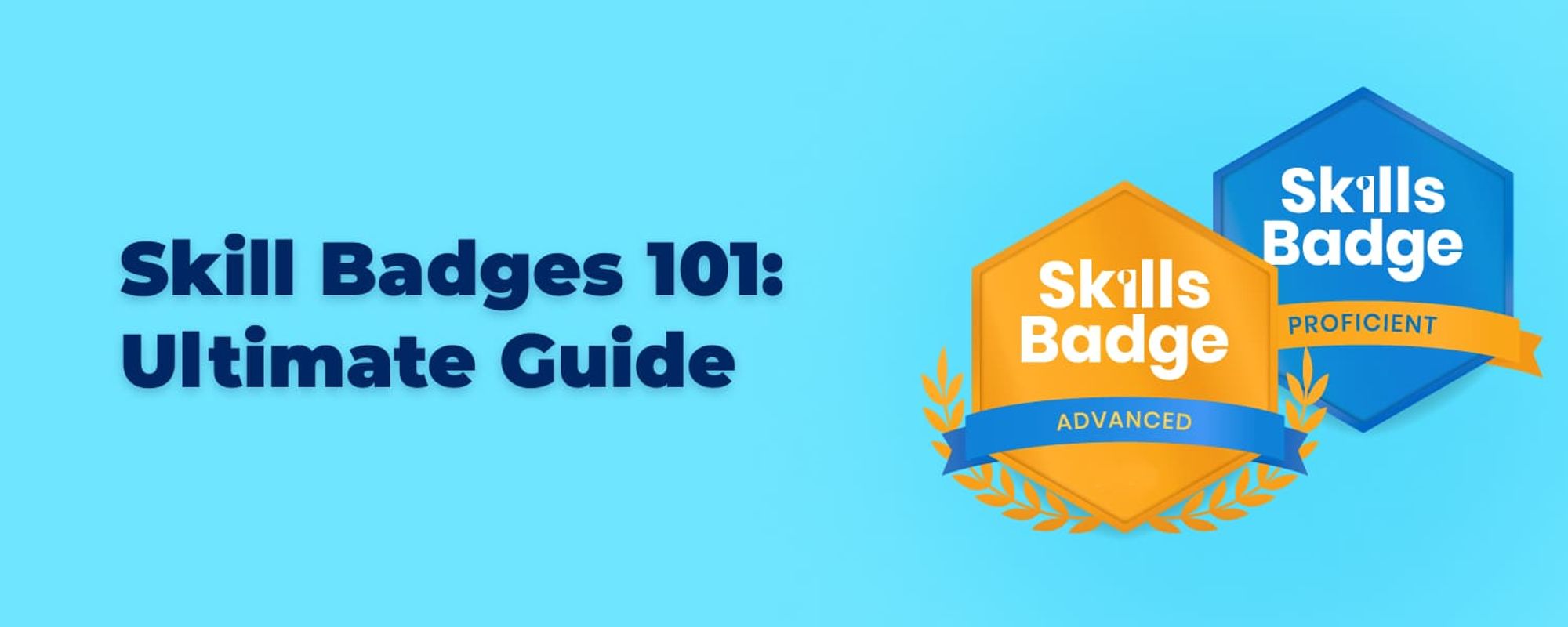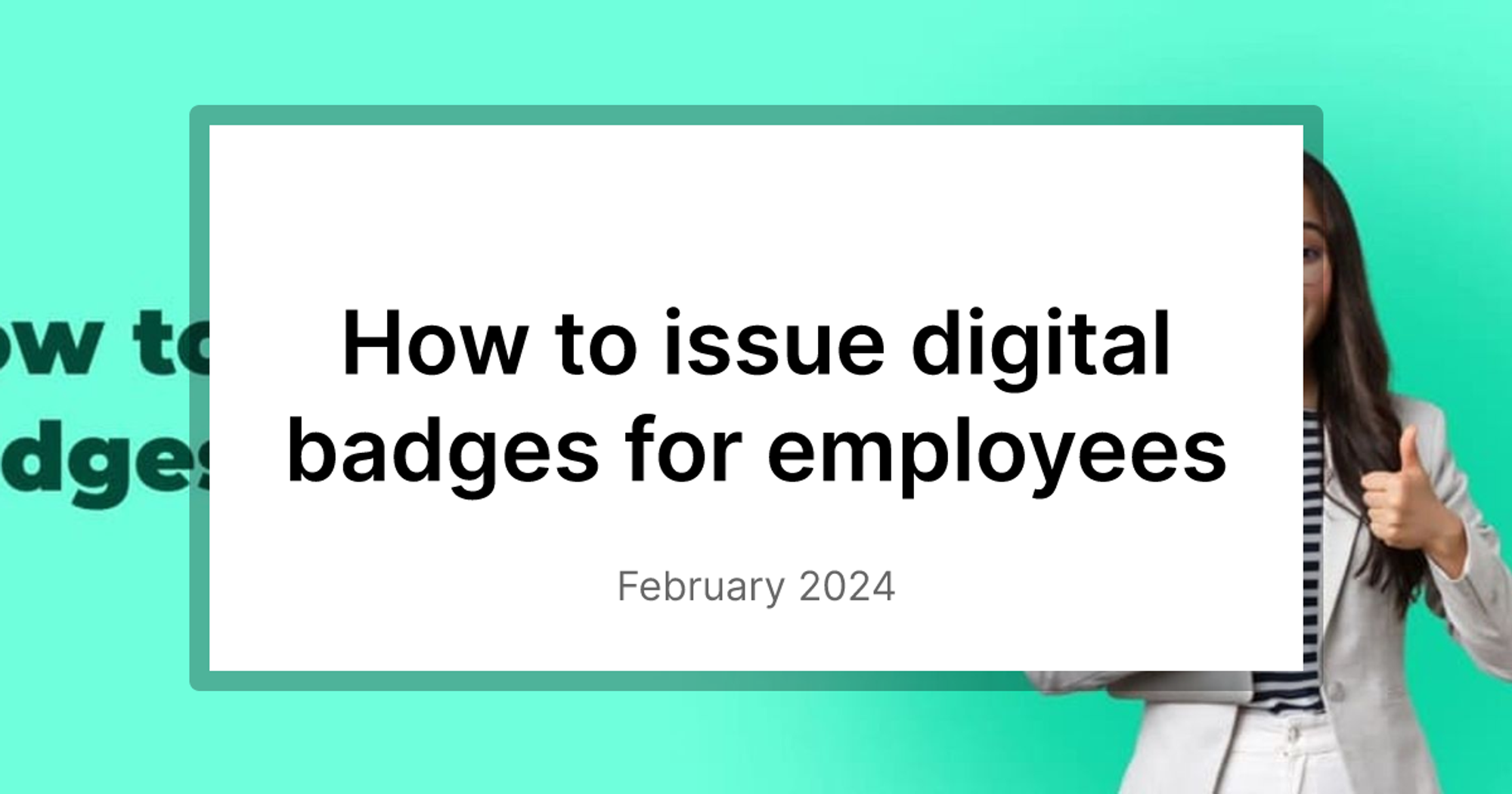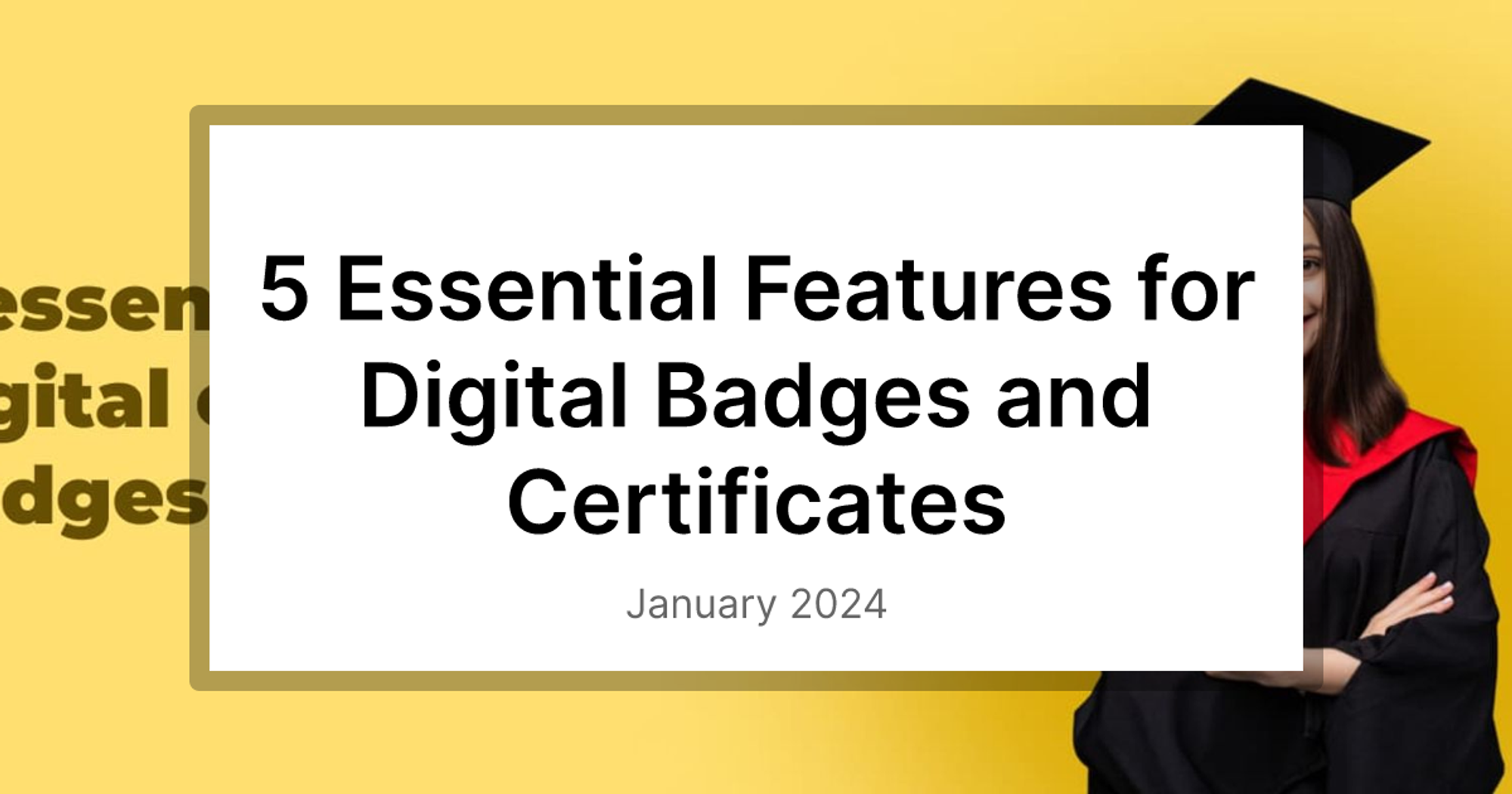Introduction
Imagine you are a hiring manager looking for a web developer. You have hundreds of resumes to sift through, but most of them look the same. How do you know who has the skills and experience you need?
Now imagine you are a web developer looking for a job. You have spent hours learning new technologies and building projects, but how do you showcase your abilities and stand out from the crowd?

This is where skill badges come in. Skill badges are digital credentials that verify your mastery of a specific skill or topic. They are issued by reputable organizations after you complete a course, a project, or an assessment. They are displayed on your online profile, portfolio, or resume, and can be easily verified by anyone with a click.
Skill badges are not just a fancy way of showing off your achievements. They are a powerful way of demonstrating your value and potential to employers, clients, peers, and educators. They can help you land your dream job, advance your career, or learn new skills.
But how do you earn skill badges? How do you display and share them effectively? And how do you make sure they are recognized and respected by others?
Whether you are a beginner or an expert, a student or a professional, a learner or a teacher, skill badges can help you achieve your goals and showcase your talents. Read on to find out everything you need to know about skill badges in 2024.
What are Skill badges?
Skill badges are digital credentials awarded to individuals who demonstrate proficiency in specific skills through successful completion of learning activities or assessments. These badges act as verifiable micro-credentials, showcasing an individual's knowledge and abilities in a particular domain. They can be considered a subset of digital badges that represent a skill.
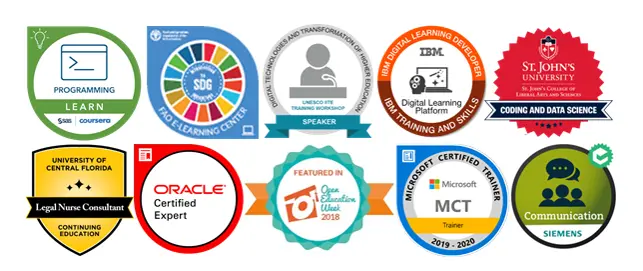
Here's a breakdown of the key points:
- Digital credentials: Unlike traditional paper certificates, skill badges are electronic records stored and accessed online.
- Awarded by: Organizations, institutions, or platforms offering learning experiences can issue skill badges to successful learners.
- Demonstrate proficiency: Skill badges signify an individual's ability to perform specific tasks or apply knowledge relevant to the badge's designated skill.
- Completion of learning activities: Earning a skill badge often involves completing online courses, workshops, hands-on projects, or passing assessments.
- Micro-credentials: Compared to comprehensive certifications, skill badges focus on smaller, targeted skill sets.
- Showcase knowledge and abilities: Skill badges provide a visual representation of an individual's skills, which can be shared on online profiles, resumes, or portfolios.
Importance of Skill badges
In today's rapidly evolving job market, demonstrating your skills effectively can be crucial for standing out from the crowd. Skill badges have emerged as a powerful tool for individuals and organizations alike, offering several key benefits:
1. Validating and showcasing skills: Unlike traditional resumes that rely solely on self-reported skills, skill badges provide verifiable evidence of one's proficiency. By completing accredited learning programs or assessments, individuals earn badges that showcase their competency in specific areas, adding credibility to their skillset.
2. Increased marketability: In a competitive environment, potential employers actively seek individuals with the necessary skills to excel in their roles. Skill badges allow job seekers to visually display their relevant skills, making their profiles more appealing to recruiters and hiring managers.
3. Continuous learning and skill development: Skill badges encourage lifelong learning by recognizing and rewarding individuals for acquiring new skills. This motivates individuals to continuously upskill and reskill, keeping their skillset relevant to evolving industry demands and career aspirations.
4. Improved engagement and motivation: Whether used in educational settings or corporate training programs, skill badges can boost learner engagement and motivation. The act of earning badges provides a sense of achievement and recognition, encouraging individuals to stay committed to their learning journey.
5. Bridge between traditional credentials and informal learning: Skill badges bridge the gap between formal certifications and informal learning experiences. Skills acquired through online courses, workshops, or even self-directed learning can be recognized and validated through badges, giving individuals a way to showcase their comprehensive knowledge and abilities.
In essence, skill badges offer a dynamic and flexible way to document, verify, and communicate your skills in a digital age. By leveraging this valuable tool, individuals can enhance their career prospects and demonstrate their commitment to continuous learning and professional development.
What is skill-based hiring?
The way we work is constantly evolving, and traditional hiring methods based solely on degrees and experience are no longer enough. Recruiters are turning their attention to skill-based hiring, which prioritizes finding individuals with the specific abilities and knowledge needed for the job, regardless of their background. This approach leads to better matches, fosters diversity, and helps companies find individuals with the potential to adapt and thrive in a changing world.
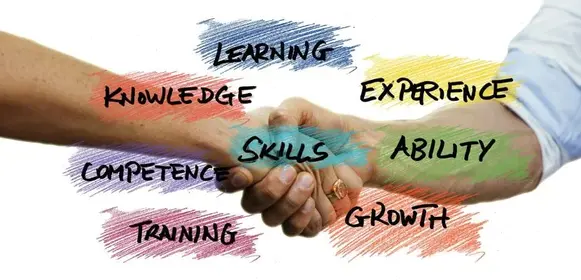
Skill badges play a crucial role in this shift. By providing verifiable proof of skills acquired through various learning experiences, badges empower individuals to showcase their true capabilities and make them more attractive to employers seeking talent with the right skills for the job. Skill-based hiring and skill badges work hand-in-hand, creating a win-win situation for both employers and job seekers in the evolving landscape of the modern workforce.
Some common examples of Skill badges
Few examples of Skill badges top companies issue:
- Google Cloud Skill badges
- IBM Skill badges
- Amazon Web Services Skill badges
How to issue Skill badges?
For organizations or institutions looking to implement skill badge programs, various platforms cater specifically to creating and issuing these digital credentials.
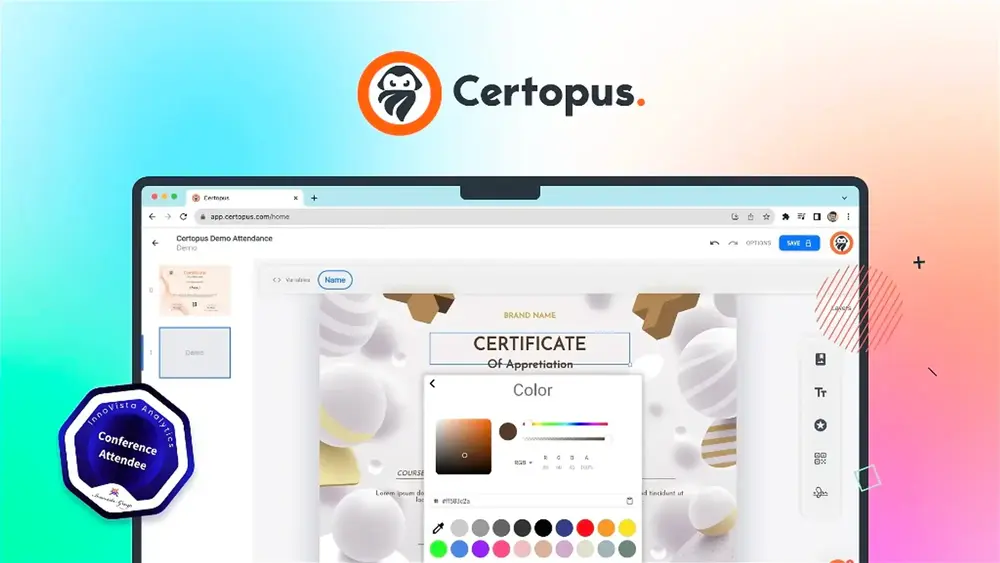
Consider a platform like Certopus, which offers a comprehensive solution for skill badge creation and management. Here's why Certopus stands out:
- Extensive Design Library: Certopus boasts a world's largest library of professionally designed badge templates, allowing you to customize badges that are visually appealing and reflect your brand identity.
- Seamless Skill Association: The platform simplifies the process of associating specific skills with badges, ensuring transparency and clarity in what each badge signifies.
- Integration with LinkedIn: Certopus seamlessly integrates with LinkedIn, enabling individuals to easily showcase their earned badges on their professional profiles, further enhancing their visibility to potential employers seeking candidates with specific skillsets.
Remember, choosing the right platform depends on your specific needs and preferences. While Certopus offers valuable features, it's recommended to explore various options and select the one that best aligns with your requirements and budget.
Conclusion
In conclusion, skill badges have emerged as powerful tools in today's evolving job market. By embracing skill-based hiring and leveraging platforms like Certopus for issuing verifiable skill badges, both organizations and individuals can navigate the changing landscape with confidence. As the focus on skills continues to grow, skill badges will play an increasingly important role in bridging the gap between learning and professional achievement, empowering individuals to showcase their unique skillsets and organizations to find the talent they need to thrive in the future of work.
Frequently Asked Questions
What are the benefits of getting a skill badge?
Skill badges offer several advantages for individuals:
- Demonstrate and validate skills: Badges act as verifiable proof of your proficiency in a specific skill, acquired through learning programs, assessments, or projects. This adds credibility to your skillset and differentiates you from other candidates.
- Boost marketability: Skill badges provide a visual representation of your skills, making your profile more appealing to recruiters and employers seeking individuals with specific skillsets. They can be showcased on resumes, portfolios, or online profiles like LinkedIn.
- Promote continuous learning: Earning badges motivates you to continuously upskill and reskill, keeping your knowledge and abilities relevant to evolving industry demands and career aspirations.
How do I choose the right platform to issue skill badges?
Choosing the right platform depends on several factors:
- Features: Consider the platform's features like badge design library, skill association options, integration with social media platforms (e.g., LinkedIn), and analytics tools.
- Ease of use: Choose a platform with a user-friendly interface that simplifies badge creation, issuance, and management.
- Cost: Explore platforms offering pricing models that align with your budget and needs.
- Security: Ensure the platform offers robust security measures to protect sensitive learner information and badge data.
While Certopus is a popular option with a vast design library and seamless LinkedIn integration, it is recommended to research and compare various platforms before making a decision.
Are skill badges considered valid proof of skills in the job market?
The validity of skill badges in the job market depends on several factors:
- Issuing authority: Badges issued by reputable institutions or organizations with established credibility carry more weight.
- Assessment process: Badges earned through rigorous assessments or industry-recognized learning programs are generally considered more valuable.
- Employer perspective: While not universally adopted, many forward-thinking companies recognize the value of skill badges as an indicator of demonstrated skills and commitment to learning.
Need more information?
Schedule a demo to learn more about Certopus for your business use case, or if you have any questions, don't hesitate to contact us. We would be delighted to assist you. Finally, if you're on social media, follow us to remain informed about our latest developments and learn more about digital credentials like certificates, badges, and micro-credentials.
Recommended Articles:
